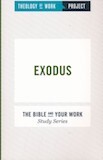Calling, Kingdom, Identity: I Will Send You (Exodus 3 Sermon Notes)
Sermon Notes / Produced by The High Calling
Exodus 3:7-15
Then the Lord said to Moses, “I have observed the misery of my people who are in Egypt; I have heard their cry on account of their taskmasters. Indeed, I know their sufferings, and I have come down to deliver them from the Egyptians, and to bring them up out of that land to a good and broad land, a land flowing with milk and honey, to the country of the Canaanites, the Hittites, the Amorites, the Perizzites, the Hivites, and the Jebusites. The cry of< the Israelites has now come to me; I have also seen how the Egyptians oppress them. So come, I will send you to Pharaoh to bring my people, the Israelites, out of Egypt.”
But Moses said to God, “Who am I that I should go to Pharaoh, and bring the Israelites out of Egypt?” He said, “I will be with you; and this shall be the sign for you that it is I who sent you: when you have brought the people out of Egypt, you shall worship God on this mountain.” But Moses said to God, “If I come to the Israelites and say to them, ‘The God of your ancestors has sent me to you,’ and they ask me, ‘What is his name?’ what shall I say to them?” God said to Moses, “I AM WHO I AM.” He said further, “Thus you shall say to the Israelites, ‘I AM has sent me to you.’ ” God also said to Moses, “Thus you shall say to the Israelites, ‘The Lord, the God of your ancestors, the God of Abraham, the God of Isaac, and the God of Jacob, has sent me to you’: This is my name forever, and this my title for all generations.
Theological Focus: As individuals and as the church, people of faith are called by God to reach out to the needs
of the world. That can be especially challenging in times of great change. In our current era, when Christianity in
America is experiencing decline, we are called to reach out to those outside the church. Like Moses, when we are
called and sent, God always promises to be with us.
Introduction: “It’s a New World”
The focus of this first sermon is Exodus 3:10, the words of God to Moses: “So come, I will send you to Pharaoh to bring my people, the Israelites, out of Egypt.” The notes I’m about to share are from a sermon I preached in the congregation where I now do ministry.
During the weeks prior to preaching this text, two things were happening. First, I had been reading Diana Butler Bass’s book, Christianity after Religion: The End of Church and the Birth of a New Spiritual Awakening (HarperCollins 2012). It’s one of the many books written recently on the “spiritual but not religious” trend among people in our culture and the ongoing declines in American Christianity. Second, our congregation had just adopted a new long-range strategic plan including goals focusing on how to reach “unchurched” young adults and others who have no religious affiliation.
As I studied the story of the call of Moses and the plight of the Israelites in Egypt, I began asking myself, “To whom are we as the church sent today?” I thought about the changes in American religion during the past few decades and the declines in attendance, membership, and participation across Christian denominations. I also thought about the challenges these changes present to the church. I minister in the northeastern United States where secularization and the “post-Christian” era are well advanced. I also serve a congregation that is aging and struggling to reach younger adults and families. I decided to address these issues in my sermon.
I opened the sermon by saying, “One of the most poignant moments in the classic story Fiddler on the Roof is when the old milkman Tevye says to his wife, ‘It’s a new world, Golde. A new world.’ ” I wanted to use the “new world” metaphor to set up my later discussion of the current sea change in American Christianity and religion. I recalled for my listeners the context of Tevye’s famous line. Tevye’s daughter Hodel informs him she is going to marry the young man Perchik. Defying the longstanding tradition of matchmakers and arranged marriages, Hodel and Perchik are going to get married because they love each other. At first, Tevye forbids the marriage. But after much soul searching, he relents. The world is changing, and Tevye decides he must change with it. So he gives the young couple his blessing.
When Tevye explains all this to his wife Golde, she expresses her dismay. Tevye then says to her, “It’s a new world, Golde. A new world.” Those words speak a timeless and universal truth. As human beings we are always dealing with change. Times change, culture changes, people change. We’re faced with how to respond to the new realities. “It’s a new world, Golde. A new world.” A simple set-up for the first “move” I wanted to make in the sermon: Moses, the church in America, and our local congregation all face “a new world.”
A. A New World
1. Moses. From Tevye’s memorable line in Fiddler on the Roof, I went immediately to the story of Moses. I said something like: “That’s where Moses found himself in our story from the Book of Exodus. Moses was tending sheep in the wilderness of Sinai for his father-in-law Jethro. It was a quiet, safe, familiar world for Moses. But suddenly one day the angel of the Lord appeared to Moses in a flame of fire out of a bush…” I went on to describe the encounter just as the text describes it, ending with the words in verse 10, “I have seen the suffering of my people in Egypt; I have heard their cry; and I have come down to deliver them….So come, Moses, I will send you to Pharaoh to bring my people out of Egypt.”
God was calling Moses out of the old world he had known into a new world full of risk and uncertainty. Would Moses stay in the old safe, familiar world, or would he go?
2. The Church in America. I then moved from Tevye and Moses to the church in America today. I introduced this by saying, “Where Tevye once stood, and Moses stood, the church in America stands today.” I used this portion of the sermon to talk about some of the current trends in American Christianity. I made no assumptions about my listeners’ familiarity with these trends. Drawing in part upon Diana Butler Bass’s book, I spoke about some of the following things.
The April 4, 2009, issue of Newsweek magazine had a black cover emblazoned with a headline in large red type. The headline read, “The End of Christian America.” Though it sounded like hyperbole, there was truth in the headline. The article was accurately reporting on what sociologists and theologians have known for well over thirty years. During the last few decades, Christianity in the United States has been declining in numbers and influence. There have been tectonic shifts altering our nation’s religious landscape. The church and Christianity are no longer the dominant force in American culture, politics, and society. Christians now make up a declining percentage of the American population. The percentage of self-identified Christians has fallen 10 points since 1990, from 86 to 76 percent. And the number of Americans who claim no religious affiliation has nearly doubled since 1990, rising from 8 to 15 percent.[1]
For the last forty years historians, social scientists, and theologians have been discussing “the end of Christendom” and the emergence of “post-Christian” Western culture. Traditional forms of faith are being replaced by new varieties of spiritual, ethical, and nonreligious choices. Traditional religious institutions, whether Protestant, Catholic, or Jewish, are in a sustained decline. Even the most conservative Christian churches have stopped growing or have seen losses in membership. There is a growing number of young adult “questers” ages 25-49 who are outside the church.
One study after another shows increasing numbers of people inside and outside the church who find church-as-usual to be boring or irrelevant. Increasing numbers of people express the perception that the church is too focused on its own institutional self-preservation, that the church resists change, does not practice what it preaches, and does not minister effectively to the needs of people.[2] As Barbara Brown Taylor says it, while we in churches argue amongst ourselves about all kinds of things, “the next generation walks right past our doors without even looking in. If they are searching at all, they are searching for more than we are offering them—for a place where they may sense the presence of God….”[3]
In our rapidly changing world, the question is: How do we offer people a meaningful sense of the presence and reality of God? We face a fundamental change in how we understand the mission of the church. Local congregations must find new ways to reach out to people beyond the doors of the church. We need to invent or reinvent structures and forms that will serve the new mission. In other words, “It’s a new world, Golde. A new world.”
3. Our Church. At this point in the sermon, I tried to bring the discussion right into our community. We all know people in our own church and community who have opted out of church or organized religion. They may believe in God, but simply don’t go to church or don’t want anything to do with church.
I’m the minister of a church that was organized circa 1725. Some of the families in our church go back many generations. But they can clearly see the recent declines in participation among their family and friends. So I drew upon some of the passages in Diana Butler Bass’s book to bring these changes home to us. Fifty years ago, as Bass puts it, Americans were “unwaveringly and overwhelmingly religious.” Not so today. “Fifty years ago people were born into a religion—a faith often passed down through many generations—and tended to stay with their childhood church.” Not so today. Fifty years ago “inherited faith was an important dimension of personal identity, often intertwined with ethnicity or national origin.” Not any longer. Today traditional religious obligations and institutional loyalties have been replaced by freedom of individual choice. People are led by preference and desire instead of custom and obligation. [4]
By the way, Bass has a delightful passage in her book in which she likens religion in our choice-based society to her experience of standing in line at a coffee shop. The woman in front of her tried to order a simple cup of coffee but was confronted by the barista with endless choices. Contemporary spirituality, Bass says, is like that. The choices are endless. Everybody chooses. Take, for example, what one chooses to do on Sunday mornings. Go to church or sleep in? Read the newspaper? Soccer or hockey with the kids?[5] When it comes to religion in America, what was is no longer. “It’s a new world, Golde. A new world.”
At this point I was ready to transition to the concept of calling. I said something like, “The church in America stands where Tevye stood and where Moses once stood. The old world is gone, a new world has come. We can try to keep things just the way they are, longing for the old days. Or, we can face the new realities and learn how to adapt and change.”
B. The Call
I then talked briefly about “calling” in our lives. The words to Moses from the burning bush speak to us across the centuries: “Come, Moses, I will send you to Pharaoh to bring my people out of Egypt.”
Like Moses, people of faith are always a “called people.” We stand in a long line of people of faith who were called by God to some task or purpose in the world. The world around us may change, but people are always hurting, always seeking meaning and purpose, suffering from injustice, or experiencing physical or spiritual poverty. The Voice that spoke to Moses speaks to us, “Come, I will send you to bring healing, hope, and reconciliation to this world.”
Moses’ objections to the call offer a wonderful case study in how challenging the call of God can be in our lives. The call is often filled with risks and may seem impossible. There are many reasons to stay where we are and not go. After hearing the call, for the next 29 verses in the story, Moses resists the call by raising one objection after another (Exodus 3:11-4:13). I briefly recounted Moses’ five objections along with God’s response to each objection.
Moses repeatedly protests, “God, I can’t do it; it won’t work; I’m not the one you need here.” But God patiently persists, “Yes, you can, Moses; I’ll be with you.” What happened to Moses also happens to people like you and me. In our families and relationships, our work, when we’re facing personal decisions, or dealing with change, now and then there’s a bush that burns and a Voice that speaks. “Come, I will send you. I’ll send you to a neighbor down the street, to a friend who needs you, to a child or aging parent, to someone who is sick or dying or lonely.” However daunting the task may seem, however inadequate we feel, the Voice says, “You’re not alone. I will go with you.” Moses eventually said yes. He went, and history was
changed forever.
C. Our Response
Having spoken of the “new world” and the call Moses faced, and the new world and call the church faces, I was now ready to talk about our response. The story of Moses’ call raises at least two questions for us. First, what is it that God might be calling each of us to in our personal lives? What task, large or small, may God have in store for us? Second,
what is God calling us to do and to be as a church in this changing culture? How do we reach out to future generations of families, their children and youth, and to young adults who are outside the walls of our churches?
At this point in the sermon, I spoke about our church’s new long-range plan and its strategic goals that constitute part of our mission as a church. I specifically named each of the goals as examples of our calling as a church to address the “new world” in which we find ourselves. I noted that we have much work to do to determine how each of these goals translates into missional action in a post-Christian culture.
I then spoke about the challenge of change. Like Moses, at times we may find ourselves questioning God’s call. We may think of many reasons our church should not try new things. Like Moses’ fears and concerns, I said, these are valid concerns. We need to talk about them with each other and with God.
Conclusion: The Promise
I concluded the sermon by noting again God’s responses to each of Moses’ objections. In five different ways God said, “Don’t worry, Moses. I will be with you!” The promise is that when we respond to God’s call, God will be with us. So what is God calling you to in your life? What is God calling us to as a church? If the story of Moses tells us anything, it tells us this: God never calls us without promising us, “I will be with you.” And that makes all the difference.
*********************************************************************************************************
These sermon outlines are by The Rev. Dr. Gary Klingsporn, Senior Minister of the First
Teaching Minister and Minister of Spiritual Formation at Colonial Church, Edina, Minnesota. He served as General Editor of the multivolume series The Library of Distinctive Sermons and has contributed many articles to The High Calling website. He received the Ph.D. in Religious Studies from Baylor University in 1985. Gary and his wife Debra now live on the island of Nantucket with their two Schnauzers, Reinhold and Izzy.
Click here for a PDF of this sermon.
Other sermons in this series on Calling, Kingdom, Identity:







